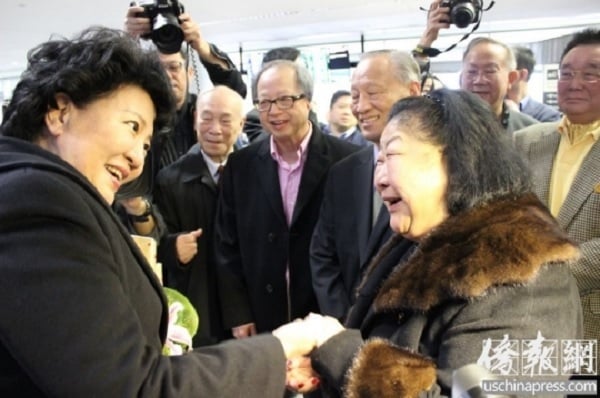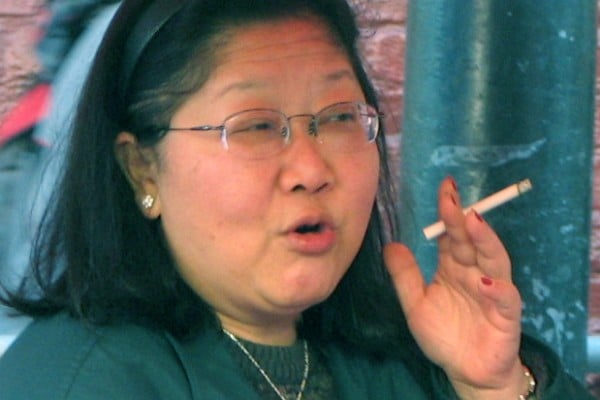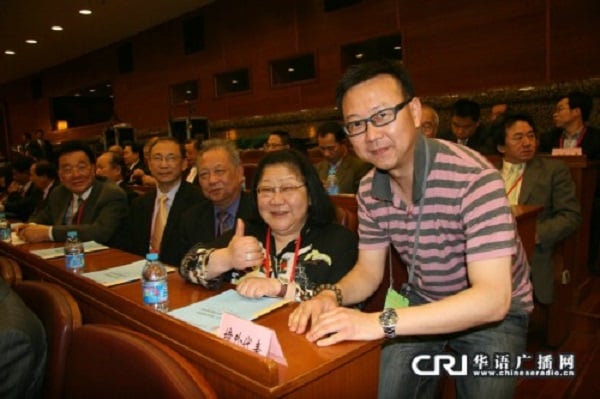
PRC State Council Overseas Chinese Affairs Office director Qiu Yuanping (left) meets China Overseas Exchange Association executive director Rose Pak in San Francisco, 2014 (U.S.-China Press)
San Francisco political operator Rose Pak, just returned to the city from an extended stay in China, has frequently been accused of hidden ties to the Chinese government. These charges have stemmed from her refusal to allow Falun Gong practitioners to participate in the annual Chinese New Year parade she controls as “de facto head” of the city’s Chinese Chamber of Commerce to allegations that she controls local elections on behalf of moneyed mainland Chinese interests.
“Shifting political winds” have long been observed in San Francisco, as Beijing has sought, bought, and gained influence in the city’s large and once staunchly pro-Taiwan Chinese American community. Beijing’s hand is suspected in the murder of pro-Taiwan Chinatown community leader Allen Leung in 2006. In such tales of political intrigue in Chinatown, Rose Pak’s name is never far away.

Rose Pak (Epoch Times).
Pak has very specific and demonstrable ties to the Chinese government. Under her Chinese name, Bai Lan (白兰), Pak is an overseas executive director with the China Overseas Exchange Association (COEA), a foreign affairs organization under the direction of the Chinese government’s State Council Overseas Chinese Affairs Office (OCAO).
COEA’s leadership is composed entirely of Chinese Communist Party officials representing various foreign affairs and “overseas propaganda” agencies of the Chinese government. These agencies, as Taiwan affairs analyst J. Michael Cole notes, are engaged in an increasingly aggressive propaganda campaign in the United States aimed at undermining U.S. support for a free and autonomous Taiwan.
OCAO director Qiu Yuanping (裘援平), a member of the Communist Party Central Committee, is also the executive vice-president of COEA. The president of COEA, Han Qide (韩启德), is also the vice-chairman of the Chinese People’s Political Consultative Conference (CPPCC) National Committee; and the vice-president of the China Council for the Promotion of Peaceful National Reunification (CCPPNR), an agency dedicated to asserting mainland Chinese control over Taiwan.
COEA poses as “non-governmental organization” while acting in fact as an overseas propaganda agency of the Chinese government and the Chinese Communist Party. As political scientist Ming Xia observes, “The Party commands, controls and integrates all other political organizations and institutions in China.”
In her capacity as an overseas executive director with COEA, Rose Pak greeted Qiu Yuanping on a visit by Qiu to San Francisco in February 2014, then appeared again in a featured spot with Qiu the following month at an assembly of the CPPCC National Committee in Beijing. Present also at Pak’s meeting with Qiu was OCAO deputy director Tan Tianxing (谭天星), likewise a ranking Communist Party member. The content of the assembly was focused squarely on China’s national interests, in particular “safeguarding and promoting reunification of the motherland.”
Pak’s attendance at the CPPCC National Committee assembly was prominently noted by the Beijing People’s Government Overseas Chinese Affairs Office; and by the Communist Party Central Committee’s United Front Work Department, which works closely with agencies such as OCAO, COEA, CCPPNR, and their associated overseas groups in asserting Beijing’s global influence.
Pak previously appeared in Beijing for the “Fifth World Conference of Overseas Chinese Friendship Associations” in 2010. Despite the “friendly” name of the conference, this was an event led entirely by Chinese Communist Party officials; and likewise dedicated entirely to asserting China’s national interests abroad, in particular to “to safeguard China’s national unity and territorial integrity and to realize the complete reunification of China.”

Rose Pak at the Fifth World Conference of Overseas Chinese Friendship Associations, Beijing, 2010 (China Radio International).
Other prominent personalities such as Florence Fang (方李邦琴) of San Francisco and Zhu Lichuang (朱立创, aka Michael Chu) of New York were among those joining Pak at the 2010 event. Fang also features as an advisor with COEA, and has an established relationship with OCAO director Qiu Yuanping and deputy director Tan Tianxing. Pak and Fang previously appeared together at a 60th anniversary National Day celebration in Beijing in 2009 also attended by Zhu and his New York associate Hua Junxiong (花俊雄).
Pak, Zhu, and Hua additionally appeared together with other “overseas compatriots” in a report on pro-China, anti-Japan “save the Diaoyu islands” protests in the United States in 2012. Here, Pak joined other pro-China San Francisco personalities in “condemning Japan’s despicable occupation of the Diaoyu Islands, telling the United States not to interfere,” and calling on all “overseas Chinese” to stand up and “defend the homeland.”
The Diaoyu Islands–known in Japanese as the Senkaku Islands–are a handful of uninhabited rocks under Japanese possession for more than 120 years, and hardly a major concern for people living in the United States. For Beijing, however, they are a handy tool for stirring up Chinese nationalism and diverting people’s attention from the much greater problem of mainland China’s threat to democracy in Taiwan.
In her capacity as an overseas executive director with COEA, Rose Pak also appeared in December 2014 at a welcoming event in San Francisco for arriving Chinese consul-general Luo Linquan (罗林泉). Appearing with Pak as a COEA “consultant” was Mr. Chi Honghu (池洪湖), founding chairman of the San Francisco Bay Area Committee to Promote the Reunification of China (旧金山湾区中国统一促进会, CPRC-SF). Chi also appeared with Pak welcoming OCAO director Qiu Yuanping to San Francisco in 2014. Like Pak, Chi has a noted history of anti-Falun Gong activities in San Francisco, including joint opposition as “community leaders” to allowing Falun Gong participation in the annual Chinese New Year parade.

Chi Honghu (left) and former Chinese consul-general Peng Keyu (right), San Francisco, 2007 (PRC Consulate-General).
Pak and Chi also share a close relationship with former Chinese consul-general Peng Keyu (彭克玉), noted in a previous post for his recorded admission that he had personally instigated violent attacks on Falun Gong practitioners in New York in 2008. In mainland Chinese media Pak and Chi appeared together at a 2004 welcoming event for Peng when he arrived to take up his post as consul-general in San Francisco, at a 2006 Chinese National Day flag-raising ceremony including a photo of Chi and Peng raising the red flag of China over San Francisco, and a 2007 farewell event for Peng on his departure to take up his post as consul-general in New York.
At all these appearance, Peng praised Pak, Chi, and other “overseas compatriots” for their patriotism, their adherence to the “one-China” policy, and their opposition to Taiwan independence. On June 1 this year current Chinese consul-general Luo Linquan appeared at a 15th anniversary event for CPRC-SF to praise Chi his and group again for their work “uniting Chinese people, promoting the reunification of China, and opposing Taiwan independence.”
One might almost think that they regard San Francisco not as an American city, but as an overseas colony of the People’s Republic of China: A quaint little Beijing-by-the-Bay, with clean air, cable cars, and walk-away crab cocktails for the pleasure of corrupt Chinese Communist Party officials.